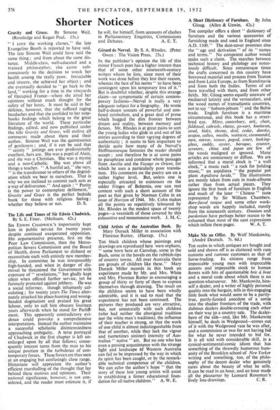Shorter Notices
Gravity and Grace. By Simone Weil. (Routledge and Kegan Paul. • 15s.) " I Love the working classes," the late Evangeline Booth is reported to have said. The late Simone Weil could have said the same thing ; and from about the same dis- tance. Middle-class, well-educated and a trained philosopher, she came sub- consciously to the decision to wreck her health among the really poor. Intractable and 'sincere, she achieved her object ; and she eventually decided to " go back to the land," working for a time in the vineyards of Occupied France—where she aired her opinions without much thought for the safety of her hosts. It must be said in her defence, however, that she suffered raging headaches and that she confided to her note- books findings which belong to the great literature of the world. These particular findings, edited, and now published under the title Gravity and Grace, will outlive all comments made about them and their author. Simone Weil was the quintessence of gentleness ; and, if it can be said that " saintly " jottings are ever professionally excellent, hers are. She was a pupil of Alain, and she was a Christian. She was a mystic and a non-Catholic. She was above all things a teacher. " A hurtful act," she says, " is the transference to others of the degrad- ation which we bear in ourselves. That is why we are inclined to commit such acts as a way of deliverance." And again : " Purity is the power to contemplate defilement." Gravity and Grace is the perfect bedside book for those with religious feeling : whether they believe or not. D. S.


































 Previous page
Previous page